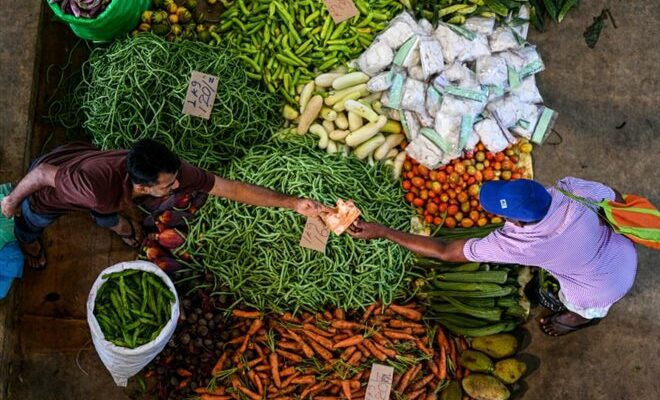A market in Colombo on March 21, 2023 (AFP/ISHARA S. KODIKARA)
The International Monetary Fund (IMF) called on Sri Lanka on Tuesday not to let corruption get in the way of the $2.9 billion bailout package it granted Sri Lanka on Monday which has been met with mixed reception in the country. .
This bailout was conditional in particular on guarantees from the Sri Lankan authorities in the fight against corruption, deeply rooted and held partly responsible for the serious economic difficulties of the country, which defaulted on its external debt in April 2022.
The agreement reached in early March with China for the restructuring of its loans in Sri Lanka also paved the way for this financing.
IMF mission chief in Sri Lanka Peter Breuer, however, recalled on Tuesday that the government had pledged to enact tougher anti-corruption laws, “essential to ensure that the hard-won gains from reforms flow to the people of Sri Lanka. lankan”.
In a speech, Sri Lankan President Ranil Wickremesinghe announced that this rescue plan would lift import bans on certain products, imposed due to a shortage of foreign currency.
“The world has accepted that Sri Lanka is no longer a bankrupt country,” he said. “Normal business can resume”.
– “We’re finished” –
The Sri Lankans seemed less enthusiastic.
“It’s not something we should celebrate proudly,” Charlotte Somaseeli, 67, told AFP. “It is a sign of the desperate situation in which we are,” added this retired police officer.
“Basically, we’re finished,” said Gehard Mendis, a 59-year-old entrepreneur. “The IMF plan is also a loan. This will increase the weight of our debt.”
Colombo turned to the Washington-based monetary institution, crushed by the weight of its foreign debt ($46 billion).
This country of 22 million inhabitants has since the pandemic been mired in a serious economic and social crisis which, among other things, caused the resignation and flight of ex-president Gotabaya Rajapaksa.
His successor Ranil Wickremesinghe led negotiations with the IMF and promised austerity measures to restore public finances.
His decision to raise taxes has already sparked new social tensions, with a nationwide strike launched on March 15 prompting the government to deploy armed soldiers to Colombo’s train stations and port.
Sri Lanka, whose economy is based on tea and tourism, is not in its first crisis and has already experienced 16 IMF aid plans since 1965.
Regularly, “we turn to the Fund because we don’t seem able to put our house in order,” said Murtaza Jafferjee, of the Colombo-based think tank, Advocata Institute, interviewed by AFP.
“But there is hope because the exit from the road this time has been of such magnitude, that there is going to be a realization and there will be lasting changes,” he added.
The Indian Ocean island experienced its worst economic recession in 2022 (-7.8%) since its independence in 1948.
© 2023 AFP
Did you like this article ? Share it with your friends with the buttons below.




